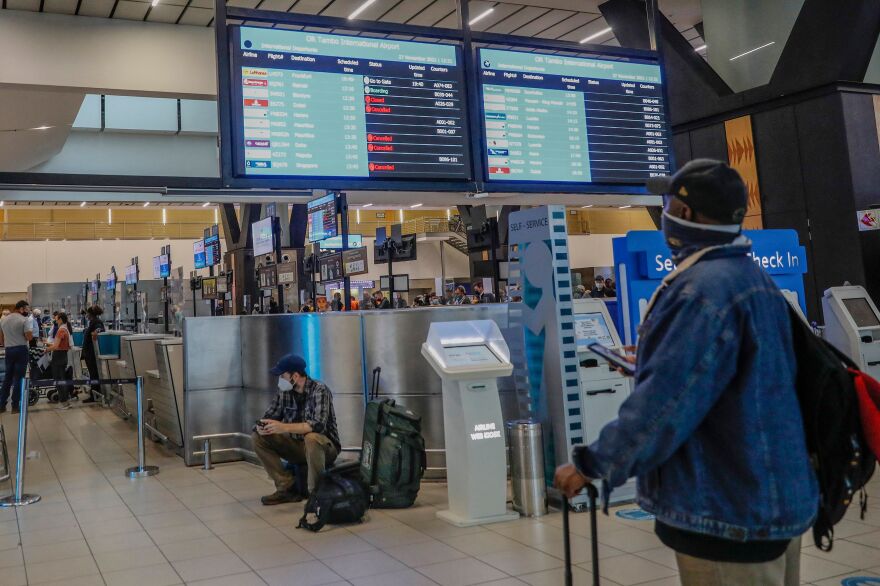Updated November 27, 2021 at 9:19 AM ET
The U.S. is putting travel restrictions in place in response to a new variant of the coronavirus circulating in southern Africa. The restrictions, which are set to take effect on Monday, are being implemented out of an abundance of caution, said a senior Biden administration official.
The World Health Organization announced Friday that it deems this strain, B.1.1.529, a variant of concern, and has named it omicron. It's the first new variant of concern since delta.
The U.S. Centers for Disease Control and Prevention announced Friday night that no cases of omicron have been identified to date in the U.S., but that the agency has surveillance systems in place and it expects the variant will be identified quickly if it emerges in the U.S.
Here's what we know so far about the new variant — and what we don't.
New coronavirus variants crop up all the time. Why are health officials so concerned about this one?
The omicron variant has been detected at faster rates than previous surges have been, suggesting it may have advantages over other variants.
The WHO says that the detection of the variant in South Africa coincided with a steep increase in cases there and that its prevalence is increasing in almost all provinces of the country. The variant has caused a particularly sharp rise in cases in the city of Pretoria, where it went from being essentially undetectable several weeks ago to now dominating the outbreak in a major city. Cases have also cropped up in Botswana, Belgium, Hong Kong and Israel during a relatively short period of time.
Why is it spreading so fast?
Scientists don't know yet, but they believe it has to do with the variant's mutations. "This variant has a large number of mutations. And those mutations have some worrying characteristics," said Dr. Maria Van Kerkhove with the WHO's Health Emergencies Program, in a video statement. Scientists say the variant has a number of mutations that are known to boost transmissibility and others that can help the virus infect cells more easily.
Still, scientists caution that there isn't enough data yet to know for sure whether that's the case.
What about the vaccines? Are there any signs the vaccine will be less effective against this variant?
There are hints in the virus's genes that vaccines could be less effective against it and that there there could be a higher risk of reinfections.
But in an interview with NPR's All Things Considered, Dr. Francis Collins, director of the National Institutes of Health, said: "Let me be clear, there is no data at the present time to indicate that the current vaccines would not work."
The concern here is based on the fact that some of omicron's mutations are ones that are already known to help the virus evade the immune system — to resist antibodies and avoid detection by some of the body's front-line defenders.
But again, scientists don't have enough data to say for sure.

What research is taking place to better understand the risks of omicron?
Researchers in South Africa and elsewhere are working to understand whether it could evade immunity; they're taking blood from people who have been vaccinated and then seeing how well the antibodies in their blood work against the omicron variant. They hope to have more data in a few weeks.
"It's really important that we have good SARS-CoV-2 surveillance around the world, including better genomic sequencing, because we want to be able to detect this virus where it's circulating," said the WHO's Van Kerkhove. She said the WHO's technical advisory group for virus evolution will be reviewing new studies as they come out to see whether there are any changes in severity of disease or any impact on diagnostics, therapeutics or vaccines.
"It's really important that these studies are done and done comprehensively," she said.
The Biden administration has already announced new travel restrictions. Who does it affect?
The list of countries includes South Africa, Botswana, Zimbabwe, Eswatini, Lesotho, Malawi, Mozambique and Namibia. The policy does not apply to American citizens or lawful permanent residents, but they must still test negative for the coronavirus prior to travel. About a dozen other countries have taken similar action, including the U.K. and some countries in Europe.
Copyright 2021 NPR. To see more, visit https://www.npr.org.












